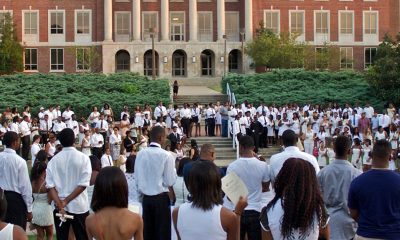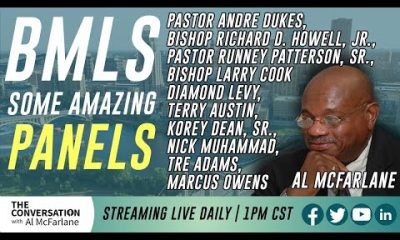Activism
Study Reveals Crisis in New Recruit Police Training Across America
NNPA NEWSWIRE — The report contended that, far too often, police recruits are trained as warriors, not as guardians and partners intended for civil communities. To effect change, new officers should receive new and adequate instruction sensitive to the communities they serve, researchers wrote. “The current state of recruit training demands that we rethink – and remake – the system for how new police officers is trained,” the researchers argued.

By Stacy M. Brown, NNPA Newswire Senior National Correspondent
@StacyBrownMedia
A comprehensive new report asserted that American authorities have traditionally trained police officers on the cheap, noting that more than 71% of agencies devote less than 5% of their total budget to recruit training.
Issued by the Police Executive Research Forum (PERF), the report found that nearly half of the agencies responding to the survey agreed that spending on recruit training had increased over the past five years.
However, that was before police budgets faced the dual challenges of cuts related to the COVID-19 pandemic and calls to “defund” the police.
The 84-page exposition noted that investments in training could be stalled or reduced at the very time they need to increase to bring about changes required in American policing.
Researchers found that in many jurisdictions, “the goal seems to be moving as many recruits as possible through academy training as fast as possible and at the lowest possible cost.”
They argued that this approach had been driven partly by the desire to quickly get more officers on the street – a challenge that became particularly acute as officer hirings declined and retirements and resignations increased because of the COVID-19 pandemic and as homicides and other violent crimes surged.
“Besides recruiting and hiring, there is perhaps no activity that is more crucial to the success of police departments and sheriffs’ offices than how they train recruits,” researchers wrote.
“Recruit training is where new officers acquire the basic knowledge and skills to do their jobs. It’s where they learn the right way to do things and have an opportunity to make mistakes and learn from them, without the serious consequences of making those mistakes in the field.”
They continued:
“It is where new officers acquire the foundation of technical know-how that will stay with them throughout their careers. But recruit training is about more than just technical instruction.
“Recruit training is where prospective officers are introduced to the concept of public safety and public service. The training academy is where police agencies can articulate their philosophy and vision and begin to instill their core values.
“Finally, recruit training is where agencies build and reinforce their culture through the next group of frontline employees.”
While policing has changed in many respects throughout the years, officers struggle with challenges on several fronts, including dealing with individuals in crisis.
The report contended that, far too often, police recruits are trained as warriors, not as guardians and partners intended for civil communities.
To effect change, new officers should receive new and adequate instruction sensitive to the communities they serve, researchers wrote.
“The current state of recruit training demands that we rethink – and remake – the system for how new police officers is trained,” the researchers argued.
“We need national consensus and national standards on what the training contains, how it is delivered, and by whom.
“This report may present a grim picture of the current state of recruit training, but it also puts forth a series of principles that can help guide the transformation of training to meet the challenges of policing for today and tomorrow.”
Chuck Wexler, the executive director of the PERF, said one could ascertain much about a police training academy from the moment an individual walks in the door and encounter a group of recruits.
“If the recruits immediately back up against the nearest wall, look straight ahead, and bark out in unison, ‘Good morning, ma’am!” or “Good afternoon, sir!” you pretty much know the culture and operating philosophy of that academy,” Wexler stated.
“If, on the other hand, the recruits pause, look you in the eye, and offer a more conversational, “Good morning, sir” or “How are you today, ma’am,” that tells you something else.
“Academies have traditionally followed a paramilitary, boot camp-like model that emphasizes discipline, deportment, following orders, and a strict hierarchy where recruits are often on the lowest rung.
Wexler continued:
“Discipline and following the chain of command are certainly important and necessary aspects of police training and operations. But when those elements become so pervasive that they overshadow almost everything else, it can undermine the academy’s mission, which is to prepare new police officers to serve and protect their communities with compassion and humanity.”
Researchers concluded the report by noting that American policing needs to re-imagine and retool recruit training.
They recommended that officials rethink how academies are operated and staffed, what the recruit curriculum contains, and how the training is delivered and by whom.
They also suggested authorities rethink how to use reality-based scenario training more broadly and effectively and how recruit training integrates with field training once recruits leave the academy.
“Re-imagining policing begins with tackling how police officers are taught. This report is a blueprint for fundamentally rethinking the current way we train new police officers – for dismantling the existing model and building a new approach,” Wexler asserted.
“The goals are ambitious and far-reaching. But we hope that if police agencies can attract those who possess the ‘right stuff,’ we can provide them with the kind of training that will take us into the future guided by a new way of thinking.”
Activism
Oakland Post: Week of April 24 – 30, 2024
The printed Weekly Edition of the Oakland Post: Week of April 24 – 30, 2024

To enlarge your view of this issue, use the slider, magnifying glass icon or full page icon in the lower right corner of the browser window. ![]()
Activism
Oakland Post: Week of April 17 – 23, 2024
The printed Weekly Edition of the Oakland Post: Week of April 17 – 23, 2024

To enlarge your view of this issue, use the slider, magnifying glass icon or full page icon in the lower right corner of the browser window. ![]()
Activism
Oakland Schools Honor Fred Korematsu Day of Civil Liberties
Every Jan. 30, OUSD commemorates the legacy of Fred Korematsu, an Oakland native, a Castlemont High School graduate, and a national symbol of resistance, resilience, and justice. His defiant stand against racial injustice and his unwavering commitment to civil rights continue to inspire the local community and the nation. Tuesday was “Fred Korematsu Day of Civil Liberties and the Constitution” in the state of California and a growing number of states across the country.

By Post Staff
Every Jan. 30, OUSD commemorates the legacy of Fred Korematsu, an Oakland native, a Castlemont High School graduate, and a national symbol of resistance, resilience, and justice.
His defiant stand against racial injustice and his unwavering commitment to civil rights continue to inspire the local community and the nation. Tuesday was “Fred Korematsu Day of Civil Liberties and the Constitution” in the state of California and a growing number of states across the country.
One OUSD school is named in his honor: Fred T. Korematsu Discovery Academy (KDA) elementary in East Oakland.
Several years ago, founding KDA Principal Charles Wilson, in a video interview with anti-hate organization “Not In Our Town,” said, “We chose the name Fred Korematsu because we really felt like the attributes that he showed in his work are things that the children need to learn … that common people can stand up and make differences in a large number of people’s lives.”
Fred Korematsu was born in Oakland on Jan. 30, 1919. His parents ran a floral nursery business, and his upbringing in Oakland shaped his worldview. His belief in the importance of standing up for your rights and the rights of others, regardless of race or background, was the foundation for his activism against racial prejudice and for the rights of Japanese Americans during World War II.
At the start of the war, Korematsu was turned away from enlisting in the National Guard and the Coast Guard because of his race. He trained as a welder, working at the docks in Oakland, but was fired after the bombing of Pearl Harbor in 1941. Fear and prejudice led to federal Executive Order 9066, which forced more than 120,000 Japanese Americans out of their homes and neighborhoods and into remote internment camps.
The 23-year-old Korematsu resisted the order. He underwent cosmetic surgery and assumed a false identity, choosing freedom over unjust imprisonment. His later arrest and conviction sparked a legal battle that would challenge the foundation of civil liberties in America.
Korematsu’s fight culminated in the Supreme Court’s initial ruling against him in 1944. He spent years in a Utah internment camp with his family, followed by time living in Salt Lake City where he was dogged by racism.
In 1976, President Gerald Ford overturned Executive Order 9066. Seven years later, the 9th Circuit Court of Appeals in San Francisco vacated Korematsu’s conviction. He said in court, “I would like to see the government admit that they were wrong and do something about it so this will never happen again to any American citizen of any race, creed, or color.”
Korematsu’s dedication and determination established him as a national icon of civil rights and social justice. He advocated for justice with Rosa Parks. In 1998, President Bill Clinton gave him the Presidential Medal of Freedom saying, “In the long history of our country’s constant search for justice, some names of ordinary citizens stand for millions of souls … To that distinguished list, today we add the name of Fred Korematsu.”
After Sept. 11, 2001, Korematsu spoke out against hatred and discrimination, saying what happened to Japanese Americans should not happen to people of Middle Eastern descent.
Korematsu’s roots in Oakland and his education in OUSD are a source of great pride for the city, according to the school district. His most famous quote, which is on the Korematsu elementary school mural, is as relevant now as ever, “If you have the feeling that something is wrong, don’t be afraid to speak up.”
-

 Activism4 weeks ago
Activism4 weeks agoOakland Post: Week of March 27 – April 2, 2024
-

 #NNPA BlackPress4 weeks ago
#NNPA BlackPress4 weeks agoBeloved Actor and Activist Louis Cameron Gossett Jr. Dies at 87
-

 Community2 weeks ago
Community2 weeks agoFinancial Assistance Bill for Descendants of Enslaved Persons to Help Them Purchase, Own, or Maintain a Home
-

 Activism3 weeks ago
Activism3 weeks agoOakland Post: Week of April 3 – 6, 2024
-

 Business2 weeks ago
Business2 weeks agoV.P. Kamala Harris: Americans With Criminal Records Will Soon Be Eligible for SBA Loans
-

 Activism2 weeks ago
Activism2 weeks agoOakland Post: Week of April 10 – 16, 2024
-

 Community2 weeks ago
Community2 weeks agoAG Bonta Says Oakland School Leaders Should Comply with State Laws to Avoid ‘Disparate Harm’ When Closing or Merging Schools
-

 Community1 week ago
Community1 week agoOakland WNBA Player to be Inducted Into Hall of Fame
























































